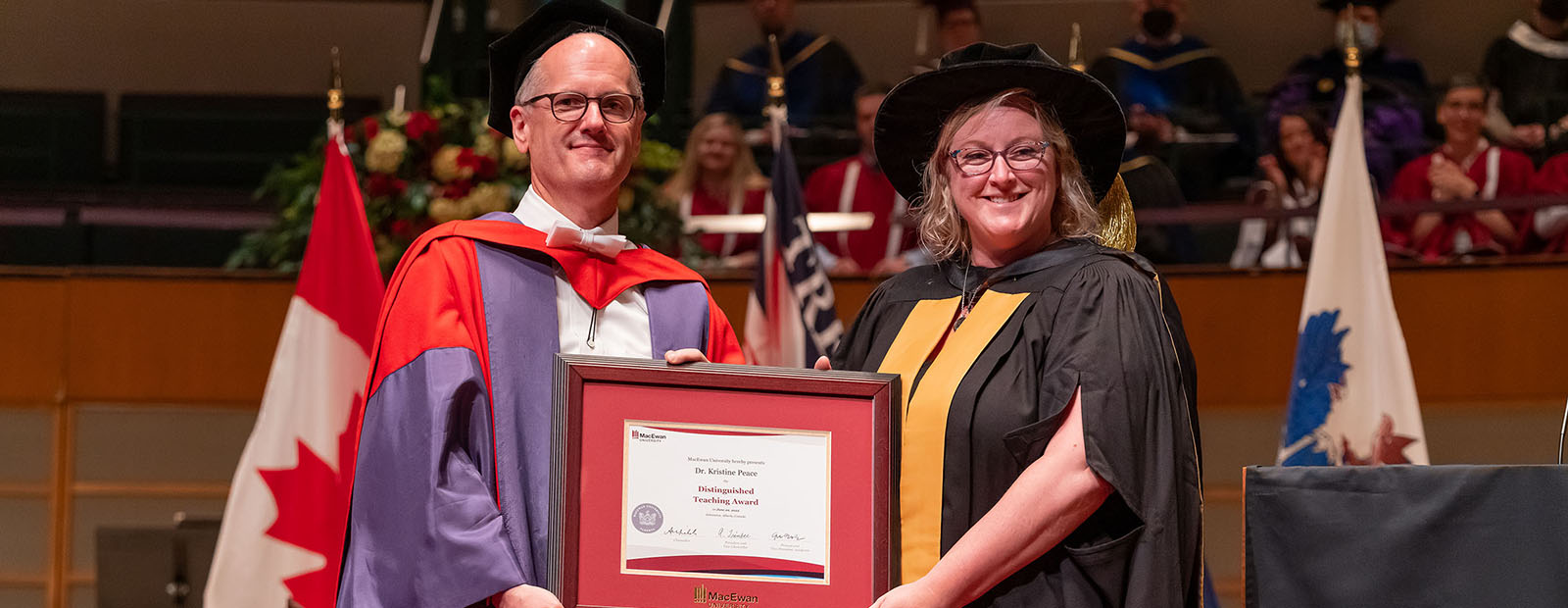Associate Professor Kristine Peace’s path into teaching was an unexpected one. She had always been interested in forensic psychology – a discipline she currently teaches at MacEwan University – but describes herself as “painfully shy,” leading her to envision a future of working in a more solitary environment, crunching crime statistics.
That all changed when, as a graduate student, she was offered the opportunity to teach an undergraduate clinical psychology course. “Teaching this course ignited a passion for being an educator,” she says. “My fate as a teacher was solidified.”
Earlier this year, Dr. Peace received the university’s Distinguished Teaching Award. Here, she shares her thoughts on engaging students, forensic myth-busting and what she enjoys most about teaching.
Q. What drew you to your discipline?
I grew up within a policing family, so I consider my interest in forensic psychology to be directly related to my developmental and experiential background.
Q. What do you love most about teaching?
The students! I really love seeing students learning, experiencing "a-ha" moments and connecting the course content to their lives or other situations on their own. I love working with students on research projects and using the process of research as a series of teachable moments. And I love creating unique and fun presentations, class activities and discussions to engage students. As I grow further in my teaching career, I seek new and innovative ways to connect students to the material they are learning, and have fun doing so!
Q. What are some of your most memorable teaching moments?
There are a multitude of moments that I recollect with fondness: Laughing hard with my students when I mess up on something in class. Including comical examples or exam answer options based on personal or class experiences. Being mistaken for a student on the first day of class and asked if the professor was any good. Doing fake interrogation demonstrations and quirky, fun memory experiments in class. Being moved to tears with my students at a poignant video.
Q. Some of the subject matter you teach is often sensationalized in media and entertainment. Does that impact the way you approach teaching those subjects?
The way that crime and concepts related to forensic psychology are portrayed in the news, movies and TV series is often biased or misrepresented. But rather than dismissing these sources, I embrace them and use them as a springboard for class discussion, research inspiration and lectures. For example, a former honours student and I were inspired by the Netflix series YOU when thinking about research and presentation topics about stalking.
In other ways, I use documentaries and TED Talks to help to debunk the myths. In fact, one pedagogical feature of the textbook I am currently writing is a “Forensic Myth-Busting” feature geared at correcting the mistaken assumptions students often hold – for example, case outcomes such as not criminally responsible, disorders such as psychopathy or pedophilia, the so-called CSI effect, and perceptions of eyewitness testimony and criminal profiling. Given that students naturally engage with these materials, I usethem to help differentiate between empirical versus anecdotal and media “evidence.”
Q. How does your work as a researcher and consultant inform your teaching practice?
The topics that I study influence my teaching practice in terms of the content that I bring into class; using teaching methods to disseminate research and using examples from case consultations provide a tangible real-life connection to course material. In class, I employ a case-to-concept approach, which has also led to an entire class based on case analysis and how psychological expertise can apply to legal cases in Canada.
A large part of my teaching also encompasses mentorship and supervision of honours and independent study students. This one-on-one teaching method is rewarding and continues to change my goals, motivations, and approach to teaching over the years.
